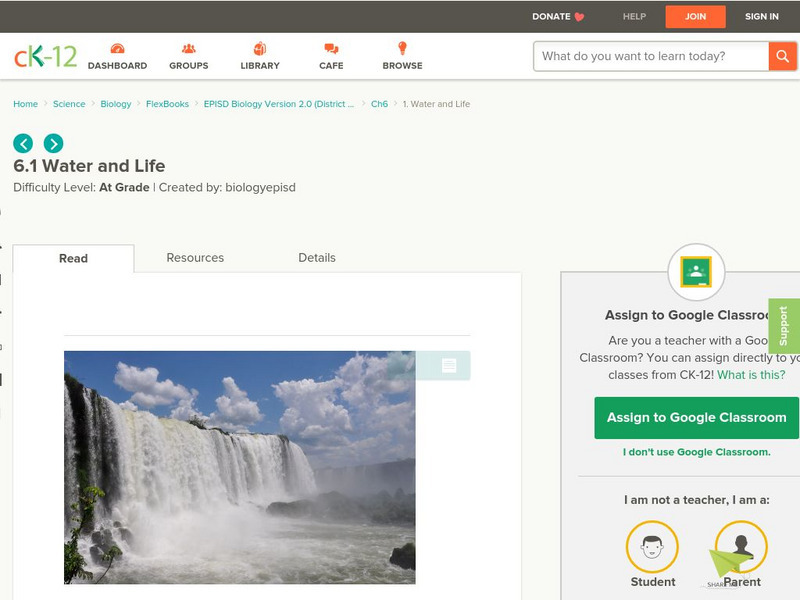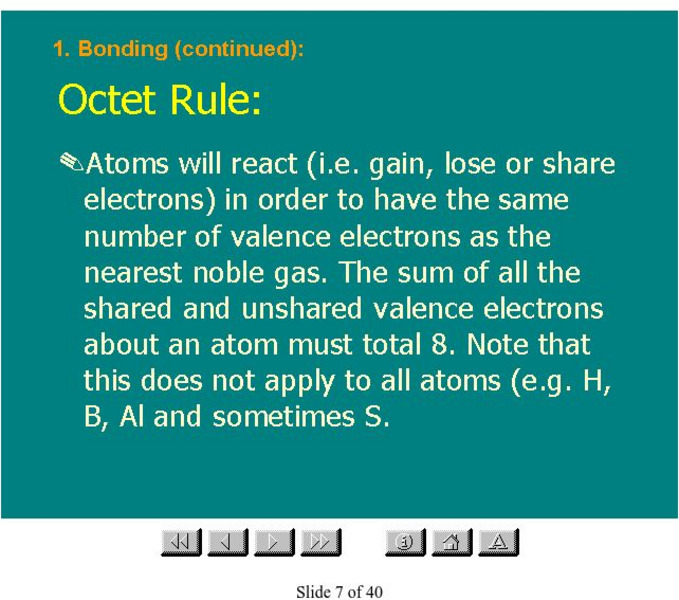Concord Consortium
Concord Consortium: Nonbonding
Bring two molecules together and observe potential energy changes.
Simon Fraser University
Chem1 Virtual Textbook: Electron Tunneling Model
Find out about shared electrons between the two nuclei. Learn about uncertainty at work.
Davidson College
Davidson College: Network Solids: Crystalline Solids
Explains the differences between ionic, molecular, metallic, and network crystalline solids. Displays structures for diamond, graphite, fullerene, and silica, accompanied by questions about their chemical bonding. Electron density plots...
National Health Museum
Access Excellence: Linus Pauling (1901 1994)
This Access Excellence site provides a general biography of Linus Pauling, the two-time Nobel laureate who the elucidated chemical bonding, amino acid and protein structures, and the molecular basis of sickle-cell anemia.
Other
Beautiful Chemistry: Beautiful Structures: Metal Organic Frameworks
Interact with these virtual structures of metal-organic frameworks. These special kinds of crystals are made of organic molecules and metal-containing units, which are linked together by chemical bonds.
Biology Pages
Kimball's Biology Pages: Electronegativity
This site, which is a personal site from Kimball's Biology, provides an overview with multiple examples of electronegativity.
CK-12 Foundation
Ck 12: Organic Reactions
[Free Registration/Login may be required to access all resource tools.] Students distinguish between substitution reactions and addition reactions, and relate the concepts of oxidation and reduction to organic reactions.
CK-12 Foundation
Ck 12: Water and Life
[Free Registration/Login may be required to access all resource tools.] The chemical and physical properties of water are examined in this lesson, including the role of hydrogen bonds in determining water's properties. The importance of...
Simon Fraser University
Chem1 Virtual Textbook: Enthalpy Diagrams
With an overview of topics related to chemical energetics, this site provides a foundation to a study of thermodynamics and its relation to enthalpy. Topics covered include bond enthalpies and bond energies, energy content of fuels,...
University of Utah
University of Utah: Genetic Science Learning Center: What Causes Dna Mutations
Provides a great overview of DNA damage from agents such as ultraviolet light, nuclear radiation, and certain chemicals. Includes DNA strand drawings.
CK-12 Foundation
Ck 12: Properties of Water
[Free Registration/Login may be required to access all resource tools.] Students look at the chemical structure of water and learn how it determines water's properties.
American Chemical Society
Middle School Chemistry: Why Does Water Dissolve Sugar?
Explore this animation to learn why water dissolves sugar.
Sophia Learning
Sophia: Science Tutorial: Matter
Created to teach students of the 21st century, SOPHIA is bringing matter straight to your fingertips. Become the commander of your own learning experiences as you take part in this interactive tutorial. [1:02]
Simon Fraser University
Chem1 Virtual Textbook: The Octet Rule
The General Chemistry Virtual Textbook, or Chem 1, is broken into several sections covering various aspects of topics related to chemistry. This section deals with the history and uses of the octet rule. Biographical information on G.N....
Towson University
Towson University: Drawing Lewis Structures
Brief rules for writing Lewis structures for simple compounds. Some examples are included.
Other
Organic Chemistry: Octet Rule
This slide presentation contains a description of the octet rule, as well as many related topics.
CK-12 Foundation
Ck 12: General Chemistry
[Free Registration/Login may be required to access all resource tools.] Students will be introduced to some of the basic concepts of chemistry.
Chem Tutor
Chem Tutor: Chemistry: Lewis Structures of the Elements
This colorful page goes over the proper techniques for writing Lewis structures for elements. This is a great place to begin learning how to write Lewis structures. When you are ready for a more advanced lesson, follow the link to learn...
CK-12 Foundation
Ck 12: Plix Series: Pi: Molecular Geometry
[Free Registration/Login Required] Use your knowledge of molecular geometry to analyze the structures, and determine which of them accurately illustrates the trigonal planar molecule Boron Trifluoride. Then answer two challenge questions...
University of California
Resonance: Drawing Resonance Structures
An extensive lesson from UCLA on drawing resonance structures. Includes several examples, and links to related topics. Practice problems are also provided.
Science Education Resource Center at Carleton College
Serc: Floating Metal Pins Discrepant Event/guided Inquiry on Surface Tension
Through a combination of an interactive demonstration and guided inquiry, students learn the basic nature of surface tension in liquids.
State University of New York
State University of New York: Atomic Electron Configuration
This simulation displays the electron configurations of for the elements in relation to the element's position on the periodic table.
State University of New York
State University of New York: Electron Configurations
The following simulation provides an interaction with electron configurations.
Famous Scientists
Famous Scientists: Linus Pauling
This biography will give you information about the life and important scientific discoveries made by Linus Pauling. His discoveries led him to be rewarded the Nobel Prize twice.
Other popular searches
- Types of Chemical Bonds
- Covalent Chemical Bonds
- Chemical Bonds Lab
- Chemical Bonds Biology
- Chemical Bonds and Reactions
- Review Chemical Bonds
- Chemistry Chemical Bonds
- Chemical Bonds Review Games
- Science, Chemical Bonds
- Chemical Bonds in Milk
- Science Chemical Bonds
- Chemical Bonds in Liquids


















